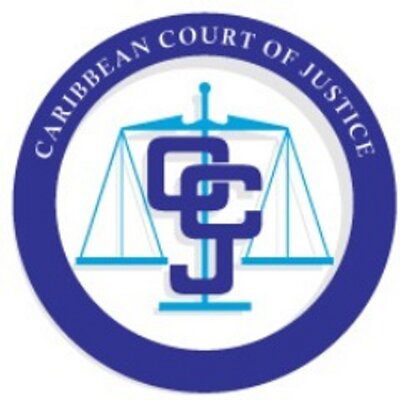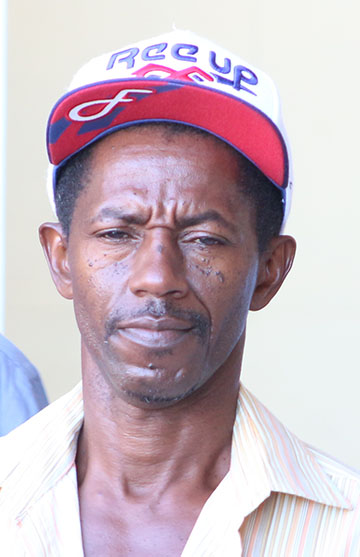At the hearing of the appeal to a 37-year sentence for sexually assaulting a child, Director of Public Prosecutions (DPP) Shalimar Ali-Hack said that the penalty imposed upon Linton Pompey was especially warranted given the specific circumstances of the case.
Ali-Hack was on Tuesday presenting arguments before the Trinidad-based Caribbean Court of Justice (CCJ) which is hearing Pompey’s appeal of the sentence which he contends is excessive.
The CCJ is Guyana’s final appellate court.
 Pompey was convicted for sexually assaulting the child on three separate occasions just under the span of a year—once for engaging in sexual activity with the 14-year-old and then raping her twice thereafter.
Pompey was convicted for sexually assaulting the child on three separate occasions just under the span of a year—once for engaging in sexual activity with the 14-year-old and then raping her twice thereafter.
Among other factors, the DPP was keen on pointing out that these circumstances justified the trial judge’s order that the five, 15 and 17 years imposed upon Pompey to be served consecutively.
Attorney Nigel Hughes who represents the convicted appellant is of the view that the sentence was too severe especially given that there are cases where people are sentenced to less than that amount for offences resulting in death, citing manslaughter as an example.
While conceding that rape by itself is an offence of considerable violence, whether attended by additional violence in the form of injury or not, counsel advanced that the manner in which the offences were committed based on the facts, were offences of “opportunity” rather than offences in which there was some degree of planning by the appellant.
Further, while noting that there was no consent and could have been none on the part of the victim, Hughes sought to point out that the offences were not attended by circumstances of “extreme violence” or “circumstances of extreme restraint.”
Dismissing his contentions, however, the DPP stressed that the abhorrent act of rape is violent nonetheless, and given, from the evidence presented, that there started to develop a pattern of sexual abuse meted out to the child, the sentence is justified.
President of the court Justice Adrian Saunders had expressed the view that Hughes had been making “too lightly” of the circumstances surrounding which the child was abused, as he underscored that it was the third occasion on which Pompey was sexually assaulting the teen.
“Had he not been caught then, heavens know how long he would have gone on preying on this young lady,” Justice Saunders opined.
Hughes clarified, however, that the offence is abhorrent, a fact he said he is not challenging, while noting that he was not treating the circumstances of the case lightly.
Instead, he said that comparatively, and in the absence of any particular guidelines, when looked at other offences for similar convictions, it was above the norm—specifically the 17-year sentence on which he was quizzed by the court.
During her submission, the court sought to enquire from the DPP whether the individual sentences imposed by the trial judge were appropriate, especially given the order that they be served consecutively.
In response, Ali-Hack began by outlining the pattern of sexual abuse which started emerging over the nine-month period which began with Pompey first fondling the teen which then led to him eventually raping her on two subsequent occasions.
Noting that he was “caught red handed,” on the last occasion, the DPP advanced that these were reasons a trial judge would have been expected to consider, and why even after imposing the individual sentences, may have gone further to order that they be served consecutively as opposed to concurrently.
Asked whether there were any mitigating factors which could have been assessed as a means of guiding the sentence, the DPP answered in the negative. She said that as a matter of fact, she searched hard to see whether there was, but found none.
She informed the court that Pompey had enjoyed his pretrial liberty having always been granted bail right up to the point of his conviction, so that there could have been no deductions for time served while awaiting trial.
She asked the court to consider also that the appellant had been convicted by a jury of his peers, noting that it was not a case where he had thrown himself at the court’s mercy by pleading to the offences.
She held the view that the sentence and punishment is intended not only to be rehabilitative, but to also serve as a deterrence.
She said that in this case, as with others, the sentence had a three-fold purpose—to be punitive, to act as a deterrent and to act as a safeguard to children of Guyana, even as she pointed out the alarming prevalence of sexual crimes.
She said that a strong message needed to be sent by the court to society that these offences would be dealt with condignly.
According to her, while these are all factors the trial judge would have considered in handing down the individual sentences, the fact that it was ordered to be served consecutively was still not excessive when one examines the very nature of the offences committed.
Ali-Hack said that the predatory nature of the convict must be considered as well as the fact that he breached a position of trust and had even assaulted the child in the sanctity of her grandmother’s home.
She said that too many children are becoming victims of sex abuse, while stressing that they must be protected.
In all the circumstances of the case, she expressed the view that the sentences and the consecutive manner in which they were imposed is justified. She further opined that had it not been imposed the way it was, it could be seen as giving licence to like-minded predators.
The DPP said that the appellant could have gotten the maximum penalty for the offences of rape which carries life imprisonment. And contrary to what Hughes had said, Ali-Hack said that life in prison means just that and not 20 years as the defence contended.
She explained that a sentence of life imprisonment is taken to mean the rest of a person’s natural life behind bars, but pointed out that the disparity arises as various judges would indicate on a life sentence, the various years which must first be served before an offender becomes eligible for parole.
The DPP urged the court to dismiss Pompey’s appeal by affirming the decision of the Guyana Court of Appeal and allowing the sentence to stand.
The court has reserved its decision which it will deliver at a date to be announced.
The appeal was heard at the seat of the court in Trinidad and Tobago by the full bench consisting Justice Saunders along with Justices Jacob Wit, Winston Anderson, Maureen Rajnauth-Lee, Denys Barrow, Andrew Burgess and Peter Jamadar.
In 2015, Pompey, a father of 12 was convicted for the sexual penetration of a child under the age of 16 on January 10th, 2012 and between June 1st and June 30th, 2013, as well as for engaging in sexual activity with the minor between May 1st and May 31st, 2011.
He was sentenced to 15 years and 17 years imprisonment on the first and second counts of rape, respectively and also to five years on the charge of sexual activity with the minor.





